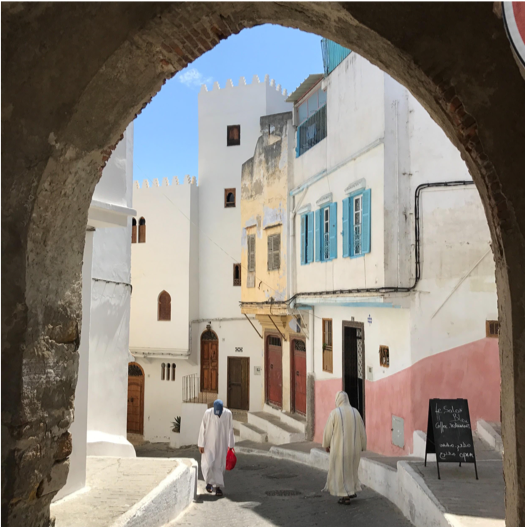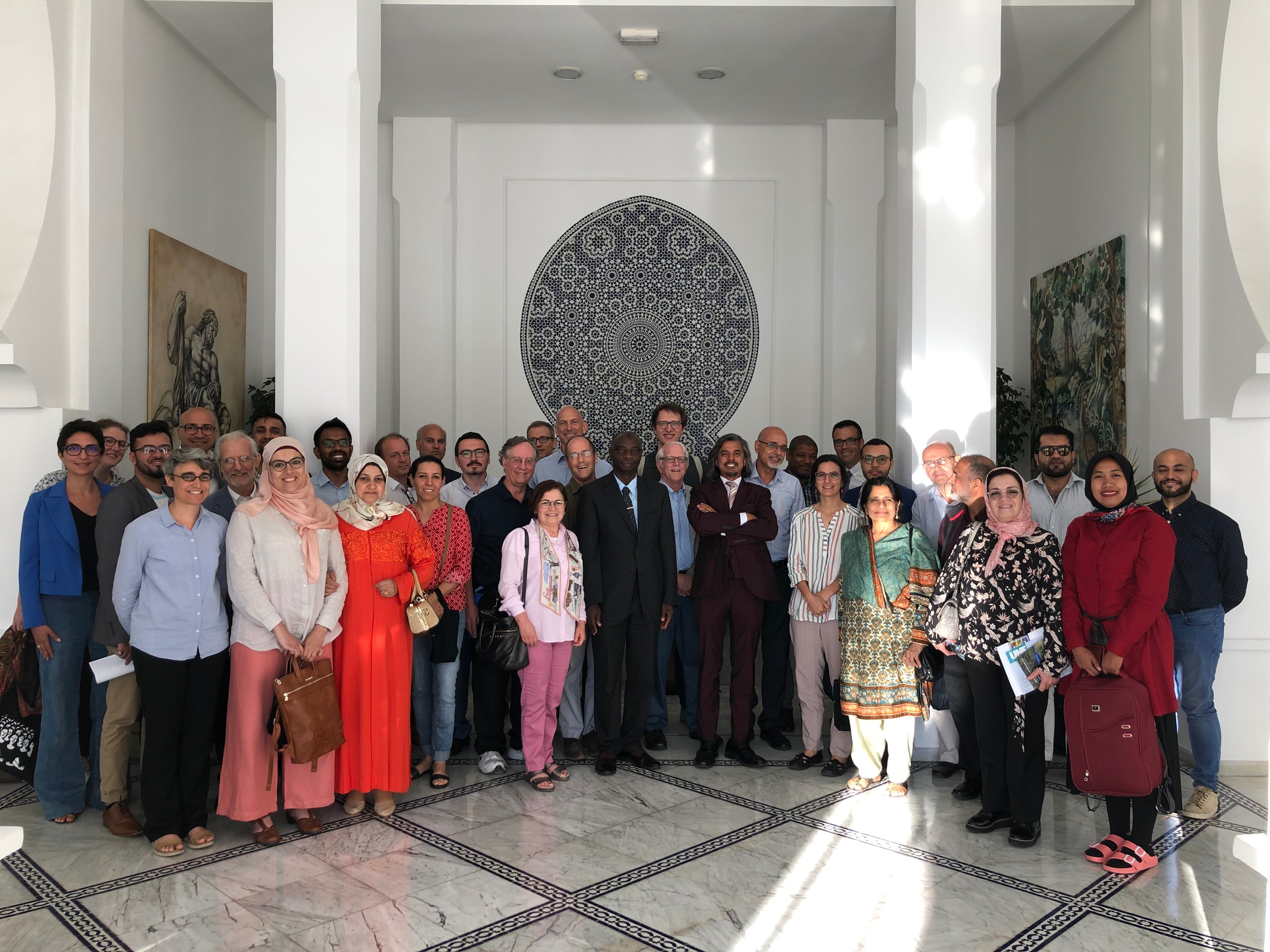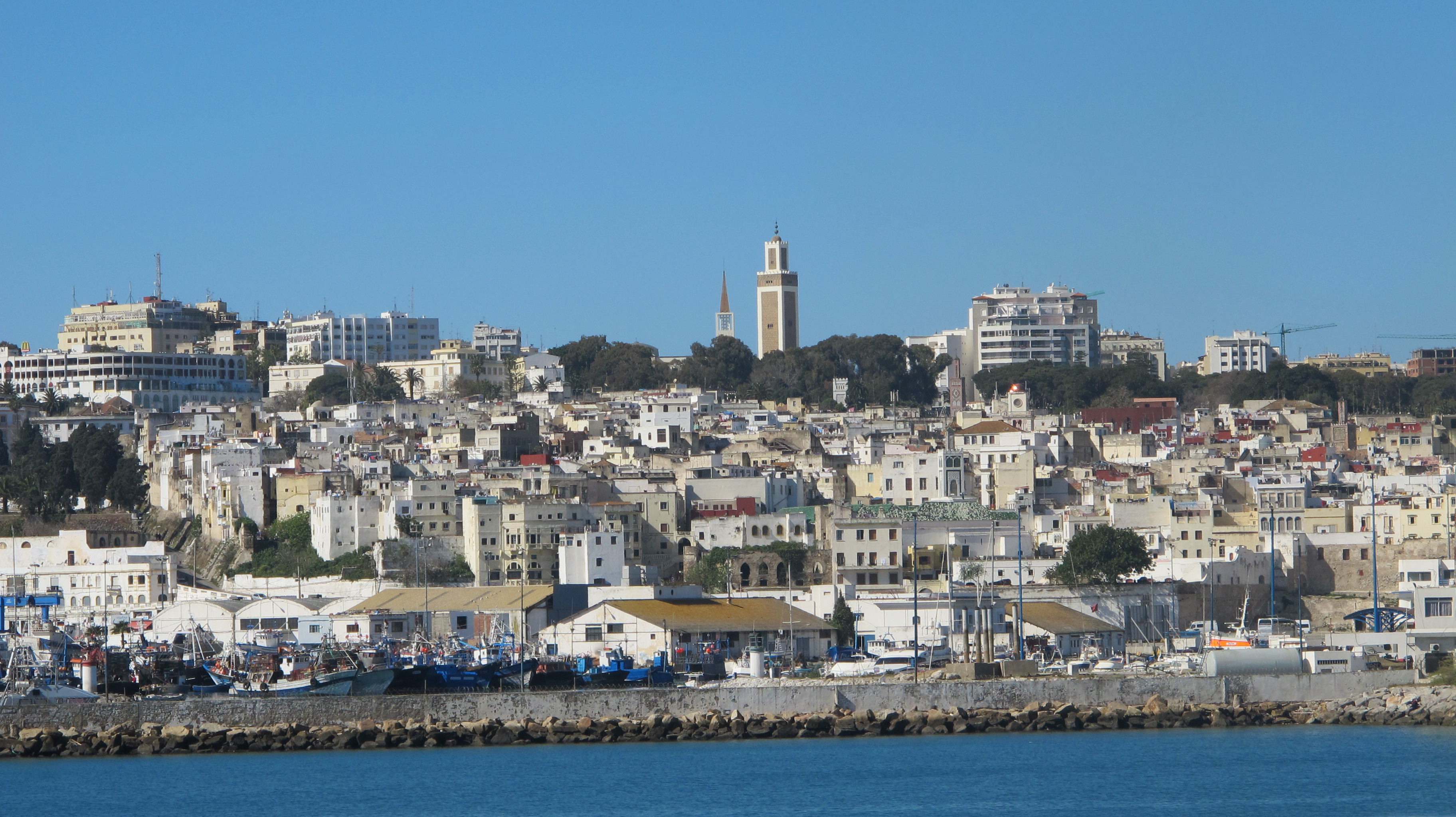Report on the International Qur’an Conference, July 25-26, 2019
Qur’anic studies may be commonly perceived as straddling something of a great divide, both institutional and intellectual, between Western scholarship and that produced in the Muslim-majority world. At the fourth biennial international meeting of IQSA held in Tangier, Morocco, scholars from at least 14 different countries convened under the aegis of an academic society helping to overcome that enduring assumption. The sheer range of topics covered suggests that as a matter of practice, the field exceeds any particular method, approach or discipline. The promise of productive debate in spite of this remains clear from the rich conversations that took place (in English, Arabic, and French) over two days at the wonderful Maghrebi-inspired architectural setting of the University of New England’s Tangier campus, where we were hosted by the Tangier Global Forum directed by Anouar Majid and facilitated by Mourad Benkirane.
 The theme of this year’s meeting, “Reading the Qur’an in the Context of Empire,” provided a broad framework for vastly disparate perspectives, from the late antique world to the age of European colonialism and beyond. Bookending precisely those two periods were the presentations by historians Juan Cole (Ann Arbor) and John Tolan (Nantes). Cole argued for evidence of an ardent pro-Roman and even “pro-Christian” attitude in the Qur’an, reading Q 30:1-5 (Sūrat al-Rūm) and other passages in light of Roman-Sassanian geopolitics. Tolan then presented the case of Napoléon Bonaparte as an enterprising reader of the Qur’an, who arrived in Egypt with a copy of Claude-Étienne Savary’s 1783 translation of the Qur’an on board his ship. Using Savary’s admiring biography of the Prophet, Tolan highlighted the “intellectual baggage” of the first French expedition in the Arab world: not only that of the ambivalent early European scholarship on Islam, but also a certain Deist idealisation of Muhammad as a pure monotheist—whom Napoleon claimed to emulate in his quest for greatness.
The theme of this year’s meeting, “Reading the Qur’an in the Context of Empire,” provided a broad framework for vastly disparate perspectives, from the late antique world to the age of European colonialism and beyond. Bookending precisely those two periods were the presentations by historians Juan Cole (Ann Arbor) and John Tolan (Nantes). Cole argued for evidence of an ardent pro-Roman and even “pro-Christian” attitude in the Qur’an, reading Q 30:1-5 (Sūrat al-Rūm) and other passages in light of Roman-Sassanian geopolitics. Tolan then presented the case of Napoléon Bonaparte as an enterprising reader of the Qur’an, who arrived in Egypt with a copy of Claude-Étienne Savary’s 1783 translation of the Qur’an on board his ship. Using Savary’s admiring biography of the Prophet, Tolan highlighted the “intellectual baggage” of the first French expedition in the Arab world: not only that of the ambivalent early European scholarship on Islam, but also a certain Deist idealisation of Muhammad as a pure monotheist—whom Napoleon claimed to emulate in his quest for greatness.
Savary’s translation would make another appearance that afternoon in the French keynote lecture by Hela Ouardi (Tunis), entitled “Quatre siècles de lecture: Histoire de l’étude du Coran en France: essai de périodisation.” She surveyed the expansive terrain of European scholarship on the Qur’an since the Middle Ages, starting with the first French translation of André du Ryer in 1647 and ending with the far-reaching Dictionnaire du Coran (2007) edited by Mohammad Amir-Moezzi. The historical significance of modern printed translations would have been further explored in the next day’s planned second keynote in English by Johanna Pink (Freiburg), on “Dying Empires, Rising Empires, and the Qur’an: Print, Translation, and missionary movements, 1900–1938.” Unfortunately, she was unable to attend due to a family loss. Instead, Fred Donner (Chicago) delivered his paper, “The Qur’an and the State,” as a substitute keynote. He argued that the Qur’an’s individualist ethos reflects a lack of ideas about statecraft and any overt political theory, requiring later Muslim thinkers to reimagine such references as “ulī l-amr minkum” (Q 4:59) that only obtained a limited sense among early exegetes.
 Of course, matters of communal identity and behavior otherwise abound in the Qur’an, variously addressed by a number of presenters. Hamza Zafer (Seattle) and Devin Stewart (Emory) both explored Qur’anic poetics as linked closely to prophetology: Zafer dwelled on the fascinating use of rainwater and its diverse fruits (Q 35:37) as metaphors for divine guidance and ecumenism, while Stewart presented a typology of the many enigmatic, “generic” stories of divine punishment of unnamed people in the past. The Qur’an can be said to articulate notions of religious authority in its critique of the rabbis, and Holger Zellentin (Cambridge) showed how it seems to be addressing a specific historical moment and type of Judaism, identifiable in his view with a “late Palestinian layer” of the Rabbinic tradition. Focusing on individual Qur’anic terms implicated in narratives about the formation of the early community, Raashid Goyal (Cornell)—on the Aʿrāb, and Suleyman Dost (Brandeis)—on the hapax “ibtahala” in Q 3:61, sought to reassess their meanings in relation to classical interpretations. Similarly focusing on a key term, Gabriel Reynolds (Notre Dame) turned his attention to tawba and its cognates to examine nuances in the Qur’anic theology of repentance, finding there a notion of divine pathos and even yearning for the human return to God.
Of course, matters of communal identity and behavior otherwise abound in the Qur’an, variously addressed by a number of presenters. Hamza Zafer (Seattle) and Devin Stewart (Emory) both explored Qur’anic poetics as linked closely to prophetology: Zafer dwelled on the fascinating use of rainwater and its diverse fruits (Q 35:37) as metaphors for divine guidance and ecumenism, while Stewart presented a typology of the many enigmatic, “generic” stories of divine punishment of unnamed people in the past. The Qur’an can be said to articulate notions of religious authority in its critique of the rabbis, and Holger Zellentin (Cambridge) showed how it seems to be addressing a specific historical moment and type of Judaism, identifiable in his view with a “late Palestinian layer” of the Rabbinic tradition. Focusing on individual Qur’anic terms implicated in narratives about the formation of the early community, Raashid Goyal (Cornell)—on the Aʿrāb, and Suleyman Dost (Brandeis)—on the hapax “ibtahala” in Q 3:61, sought to reassess their meanings in relation to classical interpretations. Similarly focusing on a key term, Gabriel Reynolds (Notre Dame) turned his attention to tawba and its cognates to examine nuances in the Qur’anic theology of repentance, finding there a notion of divine pathos and even yearning for the human return to God.
A notable strand of presentations on both days dealt with issues of canonization and reception history. Marijn van Putten (Leiden) drew attention to a certain combination of non-canonical variant readings appearing in several early Qur’anic manuscripts but unattested in the classical qirāʾāt literature. The latest research in manuscripts could thus potentially reshape our understanding of how the text was read in its early history. Highlighting the ritual of reading itself as investing authority in scripture, Anne-Sylvie Boisliveau’s (Strasbourg) paper looked at the faḍāʾil al-Qurʾān genre for insights into the status of the Qur’an in ʿAbbāsid society. Emmanuelle Stefanidis (Sorbonne) and Amidu O. Sanni (Lagos) both dealt with debates around the canonical muṣḥaf: Stefanidis spoke about 4th-5th century AH polemical works written in its defence, while Sanni directed his interest in Arabic ideas of laḥn to al-Bāqillānī’s systematic response to claims of grammatical or linguistic “errors” in the ʿUthmānic text. Pertaining to later debates on a controversial classic of tafsīr literature, Mohammed Al Dhfar (Nottingham) spoke about the possible socio-historical factors behind the Mamluk scholar al-Subkī’s intriguing decision late in life to stop teaching al-Zamakhsharī’s commentary, the Kashshāf.
The analysis of Qur’anic rhetoric, structure and literary style naturally forms a major interest in the field, and seems to be an area of particular convergence between scholars operating in different contexts. On the French panel, Michel Cuypers (Cairo), perhaps the foremost recent proponent of a coherent Qur’anic composition, delivered a paper co-authored with Sami Larbes analyzing Q 8, Sūrat al-Anfāl. Meanwhile in one of the Arabic panels, Nadeen M. Alsulaimi (Jeddah) drew upon Cuypers’s method on ring structure and Amin Ahsan Islahi’s theory of semantic pairs to analyze Q 76, Sūrat al-Insān. To reassess its conventional assignment to a Medinan versus Meccan chronology, Alsulaimi invoked the now familiar discursive move of distinguishing conclusions derived from traditional sources (bi-l-riwāyāt) and those from the text itself (bi-l-naṣṣ nafsishi aw naẓmihi).
On the subject of specific rhetorical devices, Mehdi Azaiez (Brussels) shared his research on a striking Qur’anic motif, the reported speech of those condemned (“eschatological counter-discourse”), which he examines alongside notable parallels in late antique apocalyptic literatures. Comparison as a method of literary criticism, in fact to better understand “what makes a text unique,” was the subject of Bruce Fudge’s (Geneva) compelling take on Erich Auerbach: he extended Auerbach’s classic analysis of Homeric versus Biblical style (underutilized by Arabists, he feels) to reflections on a distinct Qur’anic poetics in relation to the Bible, using the narrative of Abraham’s trial and sacrifice as a case study. Further expanding on the possibilities of comparative readings, Morgan Davis (Brigham Young) spoke on resonances between punishment stories as an apocalyptic device in the Qur’an and the Book of Mormon, illustrating again how a text’s particular use of biblical themes can in fact help underscore what makes it original.
The Qur’an’s relationship to Biblical traditions was also the subject of two Arabic presentations, by Saber Moulay Ahmed (Rabat) and Rabii al-Hashimi Noqri (al-Qarawiyyin, Fez). What is often regarded as the defining preoccupation of Qur’anic studies in the West thus appears to garner interest in the Middle East as well, where scholars are following and critically engaging with recent literature. Noqri’s paper took up the significant contributions of Geneviève Gobillot on this topic, in an effort to delineate the basic working assumptions and the paradigm of “late antiquity” (now being adopted in Arabic as awākhir al-ʿaṣr al-qadīm) that current scholarship invokes to understand scriptural intertextuality. Ahmed spoke about the Qur’an’s method of recalling stories (qiṣaṣ) previously related in the Bible, as that of Adam’s sons (Q 5:27), and he argued for focusing primarily on the “founding” texts themselves without resort to other texts. While this remains a common methodological contention, the paper by Arafat A. Razzaque (Cambridge) on Q 6:75 explored how elements of the early tafsīr tradition can prefigure the insights of modern textual criticism and evince direct Muslim knowledge of specific late antique pseudepigrapha, in this case the Testament of Abraham. The problem of text versus tradition came up in an altogether different way in Hasan Bazayniyah’s (Tunis) presentation in Arabic on Régis Blachère’s Le Coran (1949-50), which appears to interpolate into Q 53:20 the so-called “Satanic Verses” derived from the Qiṣṣat al-gharānīq accounts. Interrogating the logic of representing what is not there in the text itself, Bazayniyah reflected on the limits of interpretation in light of classical Arabic translation theory and medieval Christian translations of the Qur’an.
A fuller appreciation of the Qur’an must of course involve not only textual and historical studies, but perspectives on its role as a living text in the modern world. Akrimi Matswah (Freiburg) spoke about her fascinating research on contemporary oral tafsīr on Indonesian social media, a phenomenon thriving on numerous dedicated YouTube channels led by charismatic young teachers (many trained at al-Azhar) who are repurposing as well as de-centering the methods of established schools like the pesantren. Zahrul Fata’s (Kuala Lumpur) presentation in Arabic addressed “liberal” Muslim efforts in Indonesia to historicize religious texts and the influence there of modern Arab intellectuals like Nasr Abu Zayd, Muhammad Arkoun and Hassan Hanafi. Turning to a case study from Morrocco, Mohamed Lamallam (Georgetown) spoke about the rising school of “terminological studies” (al-Dirāsa al-Muṣṭalaḥiyya) founded by al-Shāhid al-Būshīkhī, a leading cleric based in Fez who advocates a programmatic interest in Qur’anic concepts through etymological and other linguistic analyses of its vocabulary. All of these papers together shed light on how the Qur’an remains at the heart of Muslim intellectual life today, negotiated in both novel and conventional ways.
As might be obvious from this overview but bears emphasizing, the language of scholarship and its audience can often matter more than simple factors like “Western” or “Muslim.” Thus, major French contributions to Qur’anic studies sometimes appear to be engaged with more actively even by Arabic-speaking scholars in the Francophone Maghreb than by those of us in the Anglo-American academy—not to mention our relative lack of attention to contemporary Arabic scholarship (the pitfalls of which can only explain, for instance, lingering erroneous assumptions about the sole authorship of Rāzī’s Tafsīr, as Sohaib Saeed has pointed out elsewhere). The important implications of such observations were among the deeper impressions left by this tri-lingual conference.
There is a general sense today that Qur’anic studies is flourishing, IQSA itself being a testament to this, as is the number of newly established journals, dedicated monograph series and dissertations underway. In one of the conference’s opening addresses, Devin Stewart noted that this is a fairly recent development, whereas previously there was no such field to speak of and scholarship on the Qur’an was produced in isolation and from the vantage of other areas of Arabic and Islamic Studies. Stewart put this into context with a retrospective on the field, highlighting the strong tradition of earlier German scholarship on the Qur’an in the late 19th century, which got “broken up” in the 1930s-40s with the disruptions of the Nazi era and the dispersal or death of many Jewish scholars.
The institutional and indeed political conditions of scholarship remained a subtext in other ways throughout the conference, most notably in the conspicuous absence of none other than its tireless organizer Majid Daneshgar (Freiburg), IQSA’s director for the 2019 international meeting, who was regrettably unable to travel to Tangier on account of visa delays. Several presenters scheduled on the program were missing for likely the same reason, a problem increasingly gaining attention at major academic conferences especially in the UK and US. This helps underscore all the more the significance of IQSA’s rotating international meetings, which allows scholars to share a platform they might not otherwise for a host of logistical reasons. In his concluding remarks, Emran El-Badawi (Houston) recognized the demand for such opportunities felt through the sheer number of abstracts (over 300) the organizers had received for this Tangier conference. One hopes the academy at large can self-consciously improve its ability to respond to these imperatives, and that IQSA’s future activities continue with similar success.
Arafat Abdur Razzaque is a PhD candidate in History and Middle East Studies at Harvard University.
© International Qur’anic Studies Association, 2019. All rights reserved.


